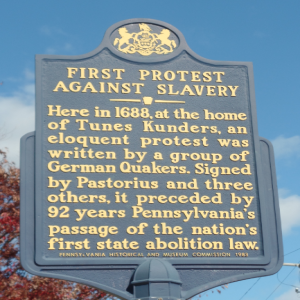
On this day in labor history, the year was 1688.
That was the day Germantown Quakers gathered to petition against slavery, in the first documented anti-slavery protest in America.
Quaker colonists in Barbados began to question slavery in the 1670s.
By 1688, founder of Germantown, Francis Daniel Pastorius and three other Quakers met at Thones Kunder’s house to craft a petition.
They urged their fellow congregants to abolish slavery.
The petition detailed its opposition to the importation, sale, and ownership of slaves.
Rooted in the Golden Rule, ”Do Unto Others as They Would Do Unto You,” the men questioned why Christians would own slaves when they would not own each other.
They argued that slaves had broad universal rights, including the right to engage in slave revolts in order to assure their freedom.
The petition traveled its way through the Quaker network but many felt it was “too weighty” a matter on which to take a position.
Those Germantown settlers who felt strongly about ending slavery left the Quaker community for the Mennonites.
Over the course of the next century, Quakers in Germantown would craft stronger anti-slavery petitions that influenced the broader Quaker community in Philadelphia to take a formal stand.
By the time of the American Revolution, Philadelphia Quakers published numerous attacks on the institution in Benjamin Franklin’s newspaper.
They formally banned the ownership of slaves at their Philadelphia Yearly Meeting in 1776.
Throughout the region, Quakers routinely raised funds for those who had escaped bondage, to start new lives and helped them integrate into Quaker communities.
Quakers would continue to play a prominent and active role in the Abolitionist movement and the Underground Railroad.
More Episodes
 2024-09-09
2024-09-09
 2024-09-07
2024-09-07
 2024-09-06
2024-09-06
 2024-09-06
2024-09-06
 2024-09-05
2024-09-05
 2024-08-30
2024-08-30
 2024-08-28
2024-08-28
 2024-08-27
2024-08-27
 2024-08-26
2024-08-26
 2024-08-25
2024-08-25
 2024-08-23
2024-08-23
 2024-08-23
2024-08-23
Create your
podcast in
minutes
- Full-featured podcast site
- Unlimited storage and bandwidth
- Comprehensive podcast stats
- Distribute to Apple Podcasts, Spotify, and more
- Make money with your podcast
It is Free
- Privacy Policy
- Cookie Policy
- Terms of Use
- Consent Preferences
- Copyright © 2015-2024 Podbean.com




